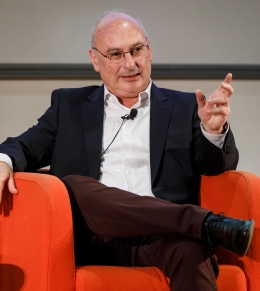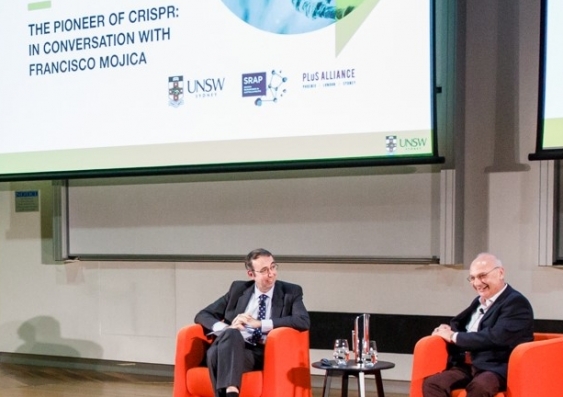Academics, researchers and students joined professionals from medical, pharmaceutical and engineering industries in a packed UNSW lecture theatre Tuesday night to hear from Spanish microbiologist Francisco Mojica, whose discovery of the gene editing tool CRISPR (Clustered Regularly Interspaced Short Palindromic Repeats) ranks among the most important scientific findings of this century.
Dr Mojica, the inaugural recipient of the PLuS Alliance Prize for Innovation, was in Sydney to speak at a UNSW Grand Challenges event, “The pioneer of CRISPR: In conversation with Francisco Mojica” with UNSW Deputy Vice-Chancellor (Academic) and Professor of Molecular Biology, Merlin Crossley.
The pair spoke about Mojica’s journey from discovering CRISPR in archaea and then in bacteria near his hometown of Alicante, Spain in 1992.
“These microorganisms have been evolving for 3000 million years so I thought there must be a good reason why this pattern existed. I focused my research on trying to understand what the repeated sequences were doing,” said Dr Mojica. “It took 10 years of work until my team and I discovered that there was a sequence between these repeats that derived from a virus, which led to the understanding that they form part of the bacterial immune system, defending against invading viruses. This just simply amazed us.”

Francisco Mojica. Photo: Jacquie Manning
It took Dr Mojica over a year to convince a journal to believe what he had found. Once the discovery was published, interest in CRISPR grew exponentially and development of potential applications has skyrocketed.
“Today we use CRISPR to change any chosen letter in an organism’s DNA code,” said Professor Crossley. “This is accelerating scientific progress enormously. And we will soon see applications – we might want to correct a disease-causing inherited error that affects blood cells, or we may want to enhance the genetic code of crops or livestock. It’s cheaper, faster and easier than ever before.”
The audience asked Dr Mojica for his take on potential CRISPR applications for personalised medicine, eradicating mosquito-borne diseases, facilitating pig organ transplants to humans and terrorism.
“CRISPR is the best molecular biology tool ever known for genome editing,” said Dr Mojica. “It has so many applications and there is still so much we don’t know. Bacteria and viruses have been fighting each other for thousands of millions of years and CRISPR is just one of the tools that they use. That I found one of these tools and it’s the best one we have to date, it’s just amazing. It’s like a very nice dream.”
Dr Mojica also toured the labs at the School of Biotechnology & Biomolecular Sciences at UNSW and delivered a public lecture in Canberra during his visit to Australia, along with talks in China and Japan, hosted by Spanish Researchers in Australia-Pacific and the Embassy of Spain.
About The PLuS Alliance
The PLuS Alliance is an international partnership that combines the strengths of three leading universities – Arizona State University, King’s College London, and UNSW Sydney – to deliver research-led solutions to global challenges and expand access to world-class learning in the key themes of sustainability, global health, social justice, and technology and innovation. https://www.plusalliance.org/
About UNSW Grand Challenges Program
The UNSW Grand Challenges Program is designed to define and lead open, informed public debate about the biggest challenges of our time – and the potential solutions. http://www.grandchallenges.unsw.edu.au/



